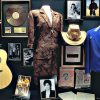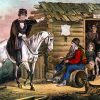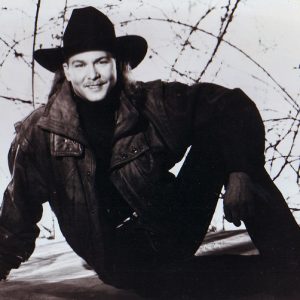calsfoundation@cals.org
Tracy Lee Lawrence (1968–)
With rural Arkansas beginnings, Tracy Lee Lawrence took Nashville, Tennessee, by storm in the early 1990s to become one of the most popular country recording artists of that decade. Lawrence quickly gained a fan base with his physical appeal, vocal ability, good-guy image, and succession of hit songs.
Tracy Lawrence was born on January 27, 1968, in Atlanta, Texas. Reared by his stay-at-home mother, JoAnn Dickens, and his stepfather, Dwayne Dickens, a banker, Lawrence had two brothers and three sisters. In 1972, the Dickens family moved to Foreman (Little River County), where Lawrence sang in the choir of the local Methodist church and learned to play guitar. While his mother wanted him to become a Methodist minister, Lawrence aspired to be a singing star and first joined a band as a teenager.
In 1986, he entered Southern Arkansas University in Magnolia (Columbia County), where he studied mass communications, but he dropped out in 1988 to become lead singer for a Louisiana-based band. When the group disbanded in 1990, Lawrence set out for Nashville. Working a variety of jobs, he supplemented his income with prize winnings from various talent contests. Following one of the contests, he was offered a spot on the radio show Live at Libby’s on WBVR in Daysville, Kentucky, where he commuted nightly to make his on-air appearance. On January 22, 1991, he performed in a showcase at the famed Bluebird Café in Nashville and was offered a contract by manager Wayne Edwards. Subsequently, Edwards secured Lawrence a record deal with Atlantic Records.
Lawrence married rodeo barrel racer Frances Weatherford in 1993; they divorced in 1996. The following year, he married Dallas Cowboys cheerleader Stephenie (Stacie) Drew, but their marriage, too, ended in divorce. In 2000, Lawrence married his third wife; they have two daughters.
The release of Lawrence’s debut album, Sticks and Stones, was delayed due to injuries he sustained on May 31, 1991, in a physical altercation with three robbers in the parking lot of a Nashville Music Row hotel. Lawrence was shot four times and required surgery. After a short hospital stay and rapid recovery, Lawrence resumed his career.
Released in late 1991, Sticks and Stones produced four singles on the Billboard country music chart. The title track spent one week at number one in January 1992. Having sold more than one million units, Sticks and Stones was certified platinum by the Recording Industry Association of America (RIAA). Subsequent Atlantic releases included Alibis (1993), I See It Now (1994), Tracy Lawrence Live and Unplugged (1995), Time Marches On (1996), The Coast Is Clear (1997), and Lessons Learned (2000), several of which were certified platinum or double platinum. From these albums came a string of major hits, including the chart toppers “Alibis,” “Can’t Break It to My Heart,” “My Second Home,” “If the Good Die Young,” “Texas Tornado,” and “Time Marches On.” In 1994, Lawrence contributed “Renegades, Rebels and Rogues” to the soundtrack of the film Maverick.
After Atlantic’s Nashville division closed in 2000, Lawrence released an album on the Warner Bros. label before joining the DreamWorks Records roster. Strong, his only DreamWorks project, came in 2003, and included the number-four single “Paint Me a Birmingham.” In 2005, Mercury Nashville released a compilation of Lawrence’s greatest hits. The following year, Lawrence partnered with his manager and brother, Laney Lawrence, to start Rocky Comfort Records. Lawrence released For the Love (2007), which contains “You Find Out Who Your Friends Are,” his first number-one hit in more than a decade. In June 2009, Lawrence released The Rock, his first inspirational album. This was followed two years later by The Singer. The Rocky Comfort label was not making sufficient funds to sustain operations, so Lawrence closed it and later established the Lawrence Music Group.
In 1992, Billboard declared Lawrence the Best New Male Artist, and, in 1993, he garnered the prestigious Top New Male Vocalist award from the Academy of Country Music. In spite of the accolades, his image has been marred by controversy throughout the years. In 1994, Lawrence was charged with aggravated assault and carrying an unlicensed weapon after he claimed to have fired in self-defense at a group of teenagers on a freeway just outside of Nashville. Then, in mid-1998, Lawrence was accused of spousal abuse and was eventually convicted of misdemeanor battery and ordered to pay a $500 fine to a women’s shelter.
Lawrence released the album Headlights, Taillights and Radios in 2013, followed by the compilation Good Ole Days in 2017, Made in America in 2019, and the three-disc album Hindsight 2020 in 2021 and 2022.
Lawrence lent his voice to the NIV Country Gospel Audio New Testament, released in 2022 and featuring the country star reading the Second Letter to the Corinthians.
Lawrence resides in suburban Nashville.
For additional information:
Cackett, Alan. The Harmony Illustrated Encyclopedia of Country Music. New York: Salamander Books, 1994.
Carlin, Richard. Country Music: A Biographical Dictionary. New York: Routledge, 2003.
Kingsbury, Paul, ed. The Encyclopedia of Country Music: The Ultimate Guide to the Music. New York: Oxford University Press, 1998.
Lockwood, Frank E. “Spreading the Word: Tracy Lawrence among 14 Recording Artists for NIV Country Gospel Audio New Testament.” Arkansas Democrat-Gazette, August 27, 2022, pp. 4B, 5B. Online at https://www.arkansasonline.com/news/2022/aug/27/spreading-the-word/ (accessed August 29, 2022).
McCloud, Barry. Definitive Country: The Ultimate Encyclopedia of Country Music and Its Performers. New York: Perigree, 1995.
Tracy Lawrence. http://www.tracylawrence.com (accessed March 28, 2022).
“Tracy Lawrence.” Country Music Television. http://www.cmt.com/artists/az/lawrence_tracy/artist.jhtml (accessed March 28, 2022).
Greg Freeman
Southern Edition
 Arkansas Entertainers Hall of Fame
Arkansas Entertainers Hall of Fame Arts, Culture, and Entertainment
Arts, Culture, and Entertainment Tracy Lawrence
Tracy Lawrence  Tracy Lawrence
Tracy Lawrence 



Comments
No comments on this entry yet.